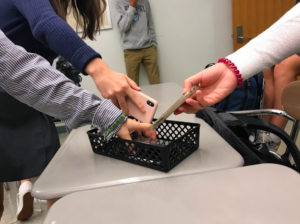Luke Giordano ‘19
Each fall students expect that the administration will have made decisions that will impact their daily lives at Episcopal. Generally these decisions seem minor but this year’s cell phone restrictions have caught many off guard.

Photo courtesy of Liz Palumbo ’19.
Nearly every student owns a smartphone device (iOS, Android, etc.). capable of navigating the internet and social media networks with relative ease. Faculty and administrators regularly voice concern about the distraction of these devices. Even more concerning to faculty and administration is the ways these devices can be used to facilitate academic dishonesty. According to Head of Upper School Mike Letts, “The Spring Semester of the 2017-2018 school year had over twelve instances of academic dishonesty, a majority of which involved the use of a cell phone.”
One of the new rules that is attempting to deal with this problems involves all cell phones being placed in black bins as students enter the classroom. In a single stroke, the administration has eliminated the possibility for academic dishonesty via cellphone while simultaneously ruling out cellphones as a possibility for distraction. Two birds, one black basket.
Currently, however, even though it is early in the year, the black basket is in every classroom within the Upper School, however remains largely untouched by a majority of teachers. Half of my classes ignore the new tool, and the others that used it initially are waning in dedication. Claire Jacoby ‘19 states: “I think the phone basket has been used in the minority of my classes, and when it is, not everyone contributes theirs.” Perhaps the faculty meeting discussing cell phone confiscation had it fresh in our minds, but it seems to be slipping further away with each passing day.
It is also questionable whether the confiscation of smartphones will really have an impact on student distractions. On the rare occasion that a cell phone is taken away, it is little more than a trivial inconvenience. Any distraction that a student might face from their phone (texting, Instagram, Facebook, games, etc.) is accessible on their laptop as well, which is used in nearly every academic class.
And while depriving students of their cell phones has no real benefit, it potentially harms their educational opportunities. Jack O’Reilly ‘19 complains: “I use my phone all the time in class to play kahoot, do quick math calculations, and navigate my school related accounts such as email and canvas. Not having it feels pretty disarming.”
While the day-to-day confiscation of cell phones in class both lacks the normalisation necessary for continuity as well as being fruitless in practice, there seems to be an agreeable middle ground. The one front on which phone usage consistently proves itself malicious in nature is academic dishonesty. Reid Powers ‘20, asks: “Why can’t they just take our phones on days when we are being assessed? This way we are able to get the benefits of using it in class, as well as getting rid of the cheating problem?”. Reid makes a powerful argument in promoting the benefits of the smartphone while eliminating it as a potential tool for academic dishonesty.
As a student body, it is our duty to appreciate the Administration’s attempt to enhance our educational experience, but it is also our responsibility to constructively criticize this system in a productive way. In the words of Michael Letts, Upper School Head, “It’s not that we think every student is ignoring their teacher to go on Instagram, but its such a ubiquitous factor in our lives that it’s become impulsive.” Lett’s concern is ultimately a generational issue that holds value outside of the classroom, shedding light on a new era of technological use that is borderline unhealthy. While the administration takes steps towards addressing topics of this caliber, it is imperative that we both criticize as well as entertain. The point inevitability of cellphone management has long past; all we can do to ensure, before changes cement, we have achieved a system that accounts both for the school’s and our own concerns.